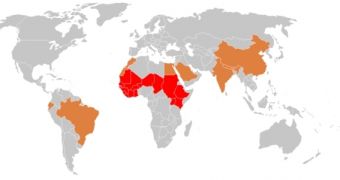The Centers for Disease Control and Prevention (CDC) cautioned doctors yesterday, November 20th, to pay extra attention to children over the coming months, as supplies of the critical booster doses for the vaccine against Haemophilus influenzae type b (Hib) bacterium are very low. Eradicated in the United States, the bacterium still causes severe damage in populations across third-world countries, especially in Africa, where Hib returns every year.
Children under the age of 5 are at the highest risk, as the disease causes the most damage by that time. Severe inflammation of the protective membranes covering both the spinal cord and the brain could lead to hearing loss, gangrenes on the limbs, disorientation and general weakness. Bacterial meningitis and sepsis – which is an infection of the blood stream – are the two forms of the diseases that physicians should be on the lookout country-wide, CDC warns.
The current lack of vaccines against Hib is caused by the fact that Merck & Co Inc, a vaccine producer, recalled all its merchandise last year, over concerns that the equipment used to create the serum was not properly sterilized. Thus, only Sanofi-Aventis Vaccines Division, Sanofi Pasteur, still has efficient Hib serums on the market. However, its production cannot cover the necessities, which prompted this situation.
Though Merck & Co Inc announced that their vaccines would be supplied again to clinics by late October, they retracted the statement and said that their products would only be available starting mid-2009. This means that children between 12 and 15 months of age will not benefit from their 4 booster dose of the medicine. Usually, infants are vaccinated when they are 2, 4, 6 and 12 months old.
The CDC instructed physicians to inform federal authorities if meningitis cases appear anywhere in the country, so that potential outbreaks could be prevented in time. As of now, the only way to detect if a child suffers from meningitis is lumbar puncture, a technique that harvests some cerebrospinal fluid from suspected patients. The Centers also asked doctors to include such a sample with their report.

 14 DAY TRIAL //
14 DAY TRIAL //